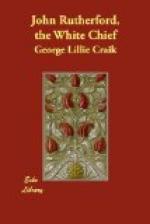“Our party continued dancing and singing all night; and the next morning they had a grand feast on the dead bodies and fern-roots, in honour of the victory they had gained. The name of the chief whose body lay in front of our huts was Ewanna. He was one of those who were at the taking of our vessel. His body was now cut into several pieces, which, being packed into baskets, covered with black mats, were put into one of the canoes, to be taken along with us down the river. There were, besides Ewanna, five other chiefs killed on our side, whose names were Nainy, Ewarree, Tometooi, Ewarrehum, and Erow.[CC] On the other side, three chiefs were killed, namely, Charly, Shungie’s eldest son, and two sons of Mootyi,[CD] a great chief of Sukyanna. Their heads were brought home by our people as trophies of war, and cured in the usual manner.
“We now left Kipara in a number of canoes, and proceeded down the river to a place called Shaurakke,[CE] where the mother of one of the chiefs who was killed resided.
“When we arrived in sight of this place, the canoes all closed together, and joined in singing a funeral song.
“By this time, several of the hills before us were crowded with women and children, who, having their faces painted with ochre, and their heads adorned with white feathers, were waving their mats, and calling out to us ‘ara mi, ara mi,’ the usual welcome home.
“When the funeral song was ended, we disembarked from our canoes, which we hauled up from the river, and our party then performed a dance, entirely naked; after which they were met by another party of warriors, from behind the hill, with whom they engaged in a sham fight, which lasted about twenty minutes. Both parties then seated themselves around the house belonging to the chief of the village, in front of which the baskets containing the dead body were at the same time placed. They were then all opened, and the head, being taken out and decorated with feathers, was placed on the top of one of the baskets; while the rest of the heads that had been taken at the battle were stuck on long spears, in various parts of the village. Meanwhile, the mother of the slain chief stood on the roof of the house, dressed in a feathered cloak and turban, continually turning herself round, wringing her hands, and crying for the loss of her son.
“The dead body having been in a few days buried with the usual ceremonies, we all prepared to return to our own village. Shaurakke is one of the most delightful spots in New Zealand, and has more cultivated land about it than I saw anywhere else. While I was here, I saw a slave-woman eat part of her own child, which had been killed by the chief, her master. I have known several instances of New Zealand women eating their children as soon as they were born.”
FOOTNOTES:
[Footnote BY: Kaipara.]
[Footnote BZ: Raumati.]




